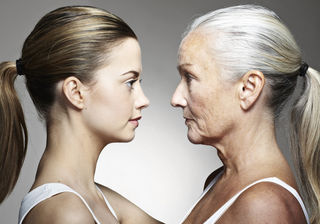Aging
Aging and Stereotyping
Stereotypes make us behave in surprisingly negative ways toward older people.
Posted May 4, 2016
By Sheri R. Levy, Ashley Lytle, and Jamie L. Macdonald
Most people hope to live long lives, yet American culture is filled with negative images of getting older. Older adulthood is thought of as a time marked by deteriorating health, poor memory, low levels of activity, loneliness, and a sense of uselessness. The truth is that these characterizations are inaccurate and they can make us anxious about growing old. They also make us feel and behave in surprisingly negative ways toward older people – we tolerate ageist jokes, age discrimination in the workplace, as well as financial and physical abuse toward older adults.

Those negative attitudes and discriminatory behaviors are what is known as AGEISM. Did you know that ageism can harm your own mental, cognitive, and physical health as you age?
What can you do? Get the facts on aging. People who know more about aging are less ageist and may be on the path to living longer and more carefree lives.
Fact or Fiction: Test your knowledge on aging
True or False?
- The majority of old people (past 65 years) have Alzheimer’s disease.
- As people grow older, their intelligence declines significantly.
- It is very difficult for older adults to learn new things.
- Most older people live in nursing homes.
- Older workers cannot work as effectively as younger workers.
- Most old people are set in their ways and unable to change.
- The majority of old people are bored.
- Participation in volunteering through organizations (e.g., churches and clubs) tends to decline among older adults.
- Abuse of older adults is not a significant problem in the U.S.
- Grandparents today take less responsibility for rearing grandchildren than ever before.
If you answered “false” to all these questions, you have a perfect score – congratulations! If you missed some questions, you are not alone. Most people including high school students, college students, teachers, and health care professionals in training score poorly on these tests. We learn very little accurate knowledge about aging at any stage in our schools, even those of us entering professions in which we will work with older adults.
So, what can you do?
When knowledge about aging increases, ageist attitudes decrease.
Educating yourself about aging can take the form of a one-hour lecture, several lectures, a multi-month course, or through reading more about aging in academic books or scientific journals.
Ageism is a societal problem that touches all of us. It creates anxiety and conflict between younger and older generations. It restricts the lives and livelihood of older adults, damaging their support systems, work opportunities, health care, their thoughts about themselves, and even their physical health – some studies show that people who buy into negative ageist stereotypes live shorter lives.
Isn’t it time to get educated about aging?
——————————————————–
All of the knowledge of aging questions are from this 50-item measure:
Breytspraak, L. & Badura, L. (2015). Facts on Aging Quiz (revised; based on Palmore (1977; 1981)). Retrieved fromhttp://info.umkc.edu/aging/quiz/
If you would like to learn more about ageism, the following might be of interest to you:
Carstensen, L. (2011). Laura Carstensen: Older people are happier. Retrieved fromhttps://www.ted.com/talks/laura_carstensen_older_people_are_happier
Levy, B. R., Slade, M. D., Kunkel, S. R., & Kasl, S. V. (2002). Longevity increased by positive self-perceptions of aging. Journal of Personality and Social Psychology, 83(2), 261-270. doi:10.1037/0022-3514.83.2.261
Levy, S.R., & Macdonald, J.L. (2016). Progress on Understanding Ageism.Journal of Social Issues, 72(1), 1-22. doi:10.1111/josi.12153
McGuire, S. L., Klein, D. A., & Couper, D. (2005). Aging Education: A National Imperative. Educational Gerontology, 31(6), 443-460. doi:10.1080/03601270590928170
Ng, R., Allore, H.G., Trentalange, M., Monin, J.K., & Levy., B.R. (2015). Increasing negativity of age stereotypes across 200 years: Evidence from a database of 400 million words. PLoS ONE, 10, e0117086.doi:10.1371/journal.pone.0117086
Wurtele, S. K. (2009). Activities of Older Adults survey: Tapping into student views of the elderly. Educational Gerontology, 35, 1026–1031. doi:10.1080/03601270902973557
Biographies:
Sheri R. Levy, is an Associate Professor in the Department of Psychology at Stony Brook University, USA. She earned her PhD at Columbia University in New York City, USA. Levy studies factors that cause and maintain prejudice, stigmatization, and negative intergroup relations and that can be harnessed to reduce bias, marginalization, and discrimination. Her research focuses on bias based on age, ethnicity, gender, nationality, race, sexual orientation, and social class. With Jamie L. Macdonald and Todd D. Nelson, Levy co-Edited a special issue of Journal of Social Issues on “Ageism: Health and Employment Contexts” (Levy, Macdonald, & Nelson, 2016). Levy’s research has been funded by the National Science Foundation, and Levy publishes her research in journals such as Basic and Applied Social Psychology, Child Development, Cultural Diversity and Ethnic Minority Psychology, Group Processes and Intergroup Relations, Journal of Personality and Social Psychology, Personality and Social Psychology Bulletin, and Social Issues and Policy Review. Levy was Editor-in-Chief of Journal of Social Issues from 2010-2013 and is a Fellow of the Society for the Psychological Study of Social Issues (Division 9 of American Psychological Association).
Ashley Lytle is a 5th year PhD candidate at Stony Brook University working with Sheri R. Levy. Ashley received her BA from DePauw University in Greencastle, Indiana, USA and her MA from Stony Brook University, New York, USA. Her research explores how prejudice, discrimination, and stereotyping impact social and health outcomes among marginalized groups. For example, much of Ashley’s research has focused on better understanding prejudice toward older adults and sexual minorities, with the ultimate goal of creating simple, yet effective, interventions to reduce prejudice. She also examines how intergroup contact and beliefs systems relate to prejudice as well as the more applied focus of understanding factors that are involved in the reduction of prejudice and stigmatization.
Jamie L. Macdonald is graduate student at Stony Brook University working with Sheri R. Levy. Jamie received her BA and MA in Psychology from Stony Brook University, New York, USA. Her research investigates prejudice, stereotyping, and discrimination with a focus on ageism in different contexts, like the workplace. She was a Co-Editor, with Sheri R. Levy and Todd D. Nelson, on a special issue of Journal of Social Issues on “Ageism: Health and Employment Contexts” (Levy, Macdonald, & Nelson, 2016).




